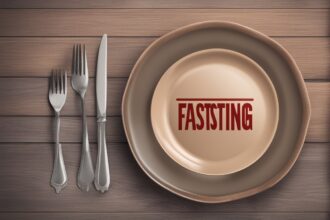Intermittent fasting (IF) has surged in popularity as a flexible and effective approach to weight loss, improved health, and mental clarity. However, with its rise, numerous myths and misunderstandings have emerged, creating confusion for those considering or practicing IF. In this post, we’ll focus on debunking common intermittent fasting misconceptions to help you separate fact from fiction and make informed decisions about your fasting journey.
1. Intermittent Fasting Means Starving Yourself
One of the most pervasive myths about intermittent fasting is that it equates to starvation. This couldn’t be further from the truth. When debunking common intermittent fasting misconceptions, it’s crucial to clarify that IF is not about depriving yourself of food but rather about structuring your eating windows. During fasting periods, your body taps into stored energy (like fat) for fuel, which can support weight loss and metabolic health. Unlike starvation, IF includes regular eating phases where you consume adequate calories and nutrients to sustain your body’s needs.
Moreover, IF can be tailored to individual preferences with methods like the 16:8 (16 hours fasting, 8 hours eating) or 5:2 (eating normally for 5 days and restricting calories for 2 days). This flexibility ensures you’re not left feeling deprived or hungry all the time.
2. Intermittent Fasting Slows Down Your Metabolism
Another common misconception is that fasting slows down metabolism, leading to weight gain over time. In reality, research suggests that short-term fasting, as practiced in IF, may actually boost metabolic rate by increasing levels of norepinephrine, a hormone that enhances fat burning. When debunking common intermittent fasting misconceptions, it’s important to note that metabolism slowdown typically occurs during prolonged starvation or extreme calorie restriction, not structured fasting.
If you’re concerned about metabolic health, combining IF with balanced nutrition during eating windows can further support your body’s energy needs. Check out our post on Nutrition Tips for Effective Fasting for more guidance on maintaining a healthy metabolism while fasting.
3. You Can Eat Anything During Eating Windows
Many believe that intermittent fasting gives you a free pass to indulge in junk food during eating windows. This is a dangerous myth. While IF focuses on when you eat rather than what you eat, the quality of your food still matters. Consuming processed, high-sugar, or unhealthy fats can undermine the benefits of fasting, such as improved insulin sensitivity and reduced inflammation.
When debunking common intermittent fasting misconceptions, we must emphasize that IF works best when paired with nutrient-dense foods like vegetables, lean proteins, whole grains, and healthy fats. For recipe ideas, explore our article on Healthy Meals for Intermittent Fasting to keep your eating windows aligned with your health goals.
4. Intermittent Fasting Causes Muscle Loss
A frequent concern among fitness enthusiasts is that fasting leads to muscle loss. This myth stems from the assumption that without constant food intake, the body breaks down muscle for energy. However, studies show that during short fasting periods, the body prioritizes fat stores over muscle tissue for fuel, especially if you engage in resistance training and consume adequate protein during eating windows.
When debunking common intermittent fasting misconceptions, it’s worth noting that IF can even support muscle preservation by increasing growth hormone levels during fasting. For more on balancing fitness with fasting, read our guide on Fasting and Exercise: A Perfect Pair.
5. Intermittent Fasting Is Unsafe for Everyone
Some assume that intermittent fasting is a one-size-fits-all approach that’s unsafe for certain populations. While it’s true that IF may not be suitable for everyone—such as pregnant women, individuals with eating disorders, or those with specific medical conditions—it can be safe and beneficial for many when done correctly. Consulting a healthcare provider before starting IF is always recommended, especially if you have underlying health issues.
In the process of debunking common intermittent fasting misconceptions, it’s critical to highlight that IF can be adapted to suit different lifestyles and health needs. For insights on who should avoid fasting, see our post on Who Should Avoid Intermittent Fasting?.
6. Intermittent Fasting Guarantees Instant Weight Loss
Lastly, many people expect immediate, dramatic weight loss results from intermittent fasting. While IF can be an effective tool for shedding pounds, it’s not a magic bullet. Weight loss depends on creating a calorie deficit, whether through fasting or traditional dieting. Additionally, factors like stress, sleep, and physical activity play significant roles in your results.
When debunking common intermittent fasting misconceptions, we must stress that sustainable weight loss with IF requires patience and consistency. Pairing fasting with mindful eating and lifestyle changes is key. Learn more about setting realistic goals in our article on Fasting for Sustainable Weight Loss.
Disclaimer: The information provided in this article is for educational purposes only and should not be considered medical advice. Intermittent fasting may not be suitable for everyone, and individual results may vary. Always consult with a healthcare professional or registered dietitian before starting any new diet or fasting regimen, especially if you have pre-existing health conditions or concerns.
References
- Harvard Health Publishing: Intermittent Fasting: Surprising Update
- National Center for Biotechnology Information: Effects of Intermittent Fasting on Health and Aging
- Mayo Clinic: Intermittent Fasting FAQ
- New England Journal of Medicine: Effects of Intermittent Fasting on Health, Aging, and Disease
- WebMD: What Is Intermittent Fasting?
This content is for informational purposes only and not a substitute for professional advice.






